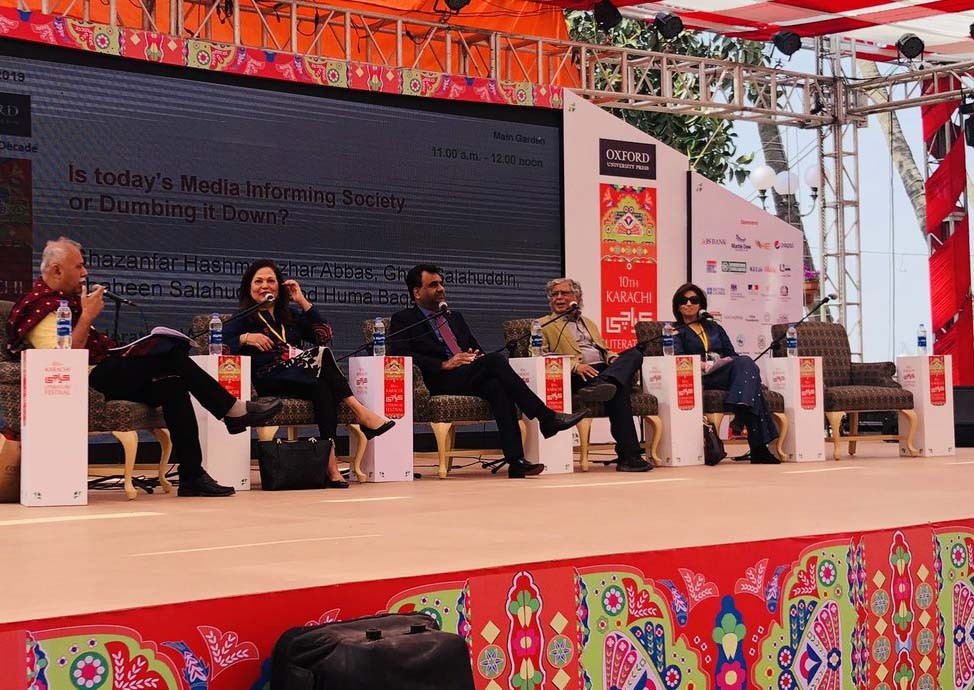
The 10th Karachi Literary Festival that brought the city out in the true sense restored the belief in society’s cerebral fitness

I have at times wondered if the intellectual yearning in our society has diminished to a point of no return. The evidence is aplenty if you follow the discourse on tv channels or read the plethora of inane messages on WhatsApp which consume our time as well as spirit.
But then comes the literary festival season and the throngs that come out in the name of books, restore your belief in society’s cerebral fitness. Adab Festival earlier in February was fabulously organised at the spacious lawns of the Governor House, but it was the recently concluded Karachi Literary Festival (KLF) that brought the city out in the true sense.
It was a three day event packed with stimulating discussions and performances culminating on Sunday night with a rock band’s performance. The Indo-Pak tensions were put to rest by the enthusiam of Karachiites, although the suspension of flights did affect participation of guests in some of the sessions.
On the first day, one of the most absorbing sessions was on English poetry suitably titled ‘Voices from near and far’, moderated by Salman Tarek Kureshi. During the session, he mentioned that English poetry and poets, once the literary staple of the Raj, still exist in our surroundings, albeit silently. Screens installed in the area displayed verses from poems of various poets, out of which Farida Fuzlullah’s poems, especially ‘Clock’, received considerable applause. The pick of the poets was Jaffar Khan Jalwana whose book of poetry, What was I thinking has recently hit the International markets. Although Jalwana lived most of his life abroad, his poetry carries a subtle flavour of Sufism. His poem, ‘Announcement’ is emblematic of this streak. The work of some of the other poets, for instance, Adrian Hussain was also received well by the audience.
The second day was much better attended as people scrambled to reach the sessions of their liking. The session ‘From Italy to Pakistan -- Geography of the soul’ with the writer Elena Nicolai on Skype was interesting as it went on to take a look at Pakistan’s landscapes and people through the eyes of a foreigner. Another widely attended session was ‘Karachi Dilemma’ in which the panelists remained undecided about whether Karachi was romantically stimulating or mundane. The discussion on judicial activism did not bring anything interesting to the table, however, the absence of former chief justice Saqib Nisar was noticeable.
The real treat on the second day was the Urdu Mushaira which was one of the most well-attended events on that day. Anwar Shaoor who presided the session was in sparkling form and recited some memorable verses pertaining to human nature and romance. While many big names could not show up, the mood was sustained by Nasira Zuberi and Ghazanfar Hashmat who got the loudest applause. Humera Rehman turned out to be the most imaginative of the lot. Performance wise, the true winner was perhaps the collective mass called the audience. The last event of the second day was Qawali which suitably rounded up the exuberant mood of the day.
On the third day, Karachiites came out in huge number. Some jostling was seen as well as people headed to different halls -- any hall that they could enter. For a period of about half an hour in the afternoon, the main passageway remained clogged. Upstairs in the Aquarius Hall, Zia Mohyeddin was about to recite Mushtaq Yousufi sahib which nobody wanted to miss while at the same time, everybody also wanted to be inside Jasmine hall which was fast getting packed to see the much-hyped short film Rani directed by Hammad Rizvi.
While Zia Mohyeddin enthralled the audience through the wit of Yousufi, a treat that was guaranteed, the same response could not be elicited through the screening of Rani. The moderator Zarrar Khuhro, in fact, had to request the audience for a louder applause. An original theme or genuine creativity regarding the plight of transgender people is probably what our movie makers are yet to tap. We must find beauty in our stories and fiction without exploiting certain sections of the underclasses.
Session on Javed Jabbar’s book What is Pakistaniat inevitably led to a discussion on the tension between India and Pakistan and handling of the situation by Pakistan. This was probably the most thought-provoking session. Outside was the crowd’s favourite Anwar Maqsood speaking before a far bigger audience in the lawns, keeping the crowd riveted with his satire on society and politics.
The layout of the event was such that the food street came first in sight after the sponsors’ stalls -- some first timers perhaps saw it as the heart of the festival and dwelled there for hours.
It has to be said that partly due to the spaciousness of Governor House’s lawns, the Adab festival had a better feel of organisation and time management.